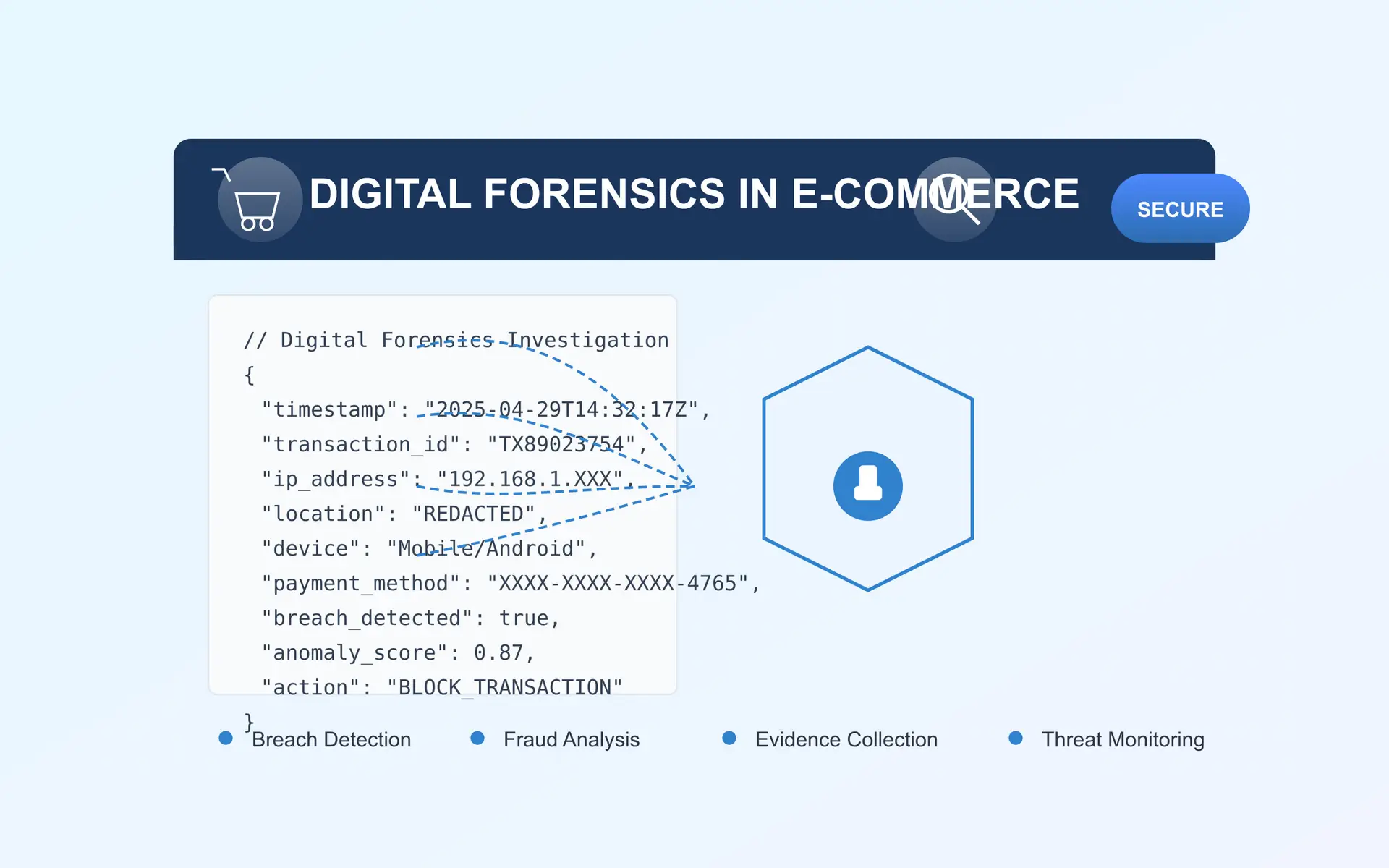
Digital forensics in e-commerce has become essential for online retailers facing increasing cybersecurity challenges. As digital businesses handle sensitive customer data and payment information, implementing strong forensic practices can mean the difference between security and catastrophic breaches. This comprehensive guide explores how digital forensics protects e-commerce businesses, its key benefits, and its limitations.
What is Digital Forensics in E-commerce?
Digital forensics in e-commerce involves the systematic investigation of digital systems to detect, analyze, and respond to security incidents. For online retailers, this process encompasses identifying vulnerabilities, preserving digital evidence, and implementing protective measures against cyber threats specifically targeting e-commerce platforms. According to the 2024 Cybersecurity Report by Accenture (nofollow), e-commerce businesses experience 43% more cyber attacks than other retail sectors.
E-commerce digital forensics typically includes:
- Proactive monitoring of e-commerce platforms for suspicious activities
- Investigating data breaches in online retail environments
- Analyzing fraud patterns in digital transactions
- Recovering compromised customer or payment data
- Providing legally admissible evidence for e-commerce-related cybercrimes
Why E-commerce Businesses Need Digital Forensics
E-commerce platforms are prime targets for cybercriminals due to the valuable data they process. Online retailers face unique challenges that make digital forensics particularly important:
- 24/7 Operation: Unlike physical stores, e-commerce never closes, creating continuous security challenges.
- Payment Processing: Digital transactions create multiple attack vectors for payment fraud.
- Customer Data Storage: Personal information databases represent valuable targets for identity thieves.
- Supply Chain Vulnerabilities: E-commerce often connects multiple systems, expanding the potential attack surface.
- Scalability Challenges: Rapid growth can outpace security infrastructure.
Check out our e-commerce vulnerability assessment tool to identify potential weaknesses in your online store.
How Digital Forensics Protects E-commerce Businesses
1. Early Threat Detection in Online Retail
Digital forensic tools continuously monitor e-commerce systems for anomalies, helping businesses identify potential threats before they compromise sensitive data. This proactive approach is essential for maintaining customer trust in online shopping environments.
2. E-commerce Breach Investigation
When security incidents occur, digital forensics helps trace the attack source. Investigators analyze system logs, recover deleted files, and examine malware behavior to determine the attack vector, methodology, and potential perpetrators within the e-commerce ecosystem. Our incident response team specializes in rapid e-commerce breach containment.
3. Legal Compliance for Online Retailers
E-commerce businesses must comply with various data protection regulations (GDPR, CCPA, etc.). Digital forensics ensures companies maintain adequate records of their cybersecurity efforts and can provide evidence to regulators following incidents.
4. E-commerce Fraud Analysis
Forensic experts can examine transaction histories, access logs, and communication records to identify fraudulent activities specific to online shopping. This capability is crucial for resolving chargeback disputes and identifying sophisticated fraud patterns.
5. Insider Threat Identification in Digital Retail
Internal threats represent a significant risk to e-commerce operations. Digital forensics helps uncover employee fraud, intentional data leaks, and policy violations that can compromise an online business.
6. Critical Data Recovery for Online Businesses
When systems crash or ransomware strikes, digital forensics tools help recover vital customer information, order histories, and inventory data, ensuring business continuity in the digital retail space.
Real-World Example: Digital Forensics Saving an E-commerce Business
An online fashion retailer noticed unusual login attempts across multiple customer accounts. By implementing digital forensic analysis, they identified a credential stuffing attack using passwords leaked from another website breach.
Thanks to early detection through forensic monitoring and detailed log analysis, the e-commerce company:
- Contained the breach before financial data was compromised
- Notified affected users promptly
- Implemented multi-factor authentication based on forensic recommendations
- Prevented potential financial losses and reputational damage
Limitations of Digital Forensics in E-commerce Protection
While digital forensics offers substantial protection for online retailers, several limitations exist:
- Primarily Reactive Nature: Often applied after security incidents occur, limiting preventative benefits
- Resource Intensity: Advanced forensic tools and skilled professionals require significant investment
- Timeline Challenges: Thorough investigations take time, potentially delaying incident response
- Encryption Barriers: Sophisticated encryption can hinder data access during investigations
- Evolving Threats: E-commerce-specific attack methods constantly change, requiring continuous forensic adaptation
For a deeper analysis of these limitations, read our comprehensive guide to e-commerce security challenges. The Cybersecurity and Infrastructure Security Agency (nofollow) also provides valuable guidelines for addressing these limitations.
Best Practices for E-commerce Digital Forensics
To maximize digital forensic benefits, online retailers should:
- Implement Real-Time Monitoring: Utilize forensic tools offering live threat tracking for e-commerce platforms
- Maintain Regular Backups: Ensure consistent data backups to aid forensic recovery after incidents
- Strengthen Authentication: Prevent unauthorized access through multi-factor authentication and robust password policies
- Conduct Staff Training: Educate employees about phishing, proper data handling, and recognizing insider threats
- Document System Activities: Maintain comprehensive logs and system records to support forensic analysis
Conclusion: Digital Forensics as a Critical E-commerce Security Component
Digital forensics in e-commerce represents more than just an emergency response—it’s an essential element of comprehensive cybersecurity strategy for online retailers. While it cannot prevent every threat, its ability to uncover attack patterns and provide actionable security insights makes it indispensable for modern e-commerce operations.
As online retail continues expanding, cybersecurity risks grow proportionally. Implementing digital forensic practices proactively helps e-commerce businesses protect customer data, maintain regulatory compliance, and preserve brand reputation in an increasingly hostile digital environment.
Don’t wait for a security crisis to prioritize digital forensics in your e-commerce business—because in online retail, reactive security measures often come too late to prevent significant damage.
Ready to strengthen your e-commerce security? Contact our digital forensics specialists today for a free security assessment or explore our e-commerce protection packages.




Leave a Reply